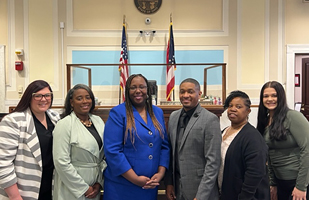Hamilton County Drug Recovery Court Awarded Grant Funding

From left to Right: Alexis Deatherage, Certification Coordinator; Kourtney Porter, Bailiff; Judge Nicole L. Sanders, Isaiah Lumpkins, Drug Court Director; Doris Vincent, Specialized Docket Assistant; Abigail Brodie, Specialized Docket Assistant

From left to Right: Alexis Deatherage, Certification Coordinator; Kourtney Porter, Bailiff; Judge Nicole L. Sanders, Isaiah Lumpkins, Drug Court Director; Doris Vincent, Specialized Docket Assistant; Abigail Brodie, Specialized Docket Assistant
The Hamilton County Drug Treatment and Recovery Court was awarded a total of $2.7 million to be used for risk assessment and treatment to provide services to the participants, their families, and the community.
The funds come from two federal grants. The Bureau of Justice Assistance and the federal Substance Abuse and Mental Health Services Administration money will be used by the court to determine the appropriate level of treatment and assign the right resources to each case.
The Hamilton County Drug Treatment and Recovery Court is one of more than 264 specialized dockets in Ohio courts. These dockets are dedicated to specific types of offenses or offenders and use a combination of holding offenders accountable while also addressing the cause of the behavior.
“Sometimes, breaking the law is a symptom of an underlying disease. In those cases, treating the disease can break a cycle of crime,” said Chief Justice Maureen O’Connor as she visited the court for the funding announcement. “We cannot throw away people, especially when the underlying cause of their criminal behavior is substance abuse disease. There is treatment available.”
The Hamilton County court is unique among specialized dockets. It is the only one created by law and the way it was created has made it the biggest of its kind in the state with about 900 active cases.
Chief Justice O’Connor praised Judge Nicole Sanders, who leads the court, and the entire court staff, her fellow judges, and partners from the legal and social service community committed to the treatment court.
Treatment providers, probation professionals, dedicated prosecutors, and defense attorneys have come together to partner with the court in conjunction with community specialists in housing, education, employment, people to help with financial issues, and the people who are committed to helping participants fill their time with positive activities as they work on their sobriety.
In just two years, the court has achieved its initial certification as a professional specialty court.
Studies have shown this team approach to working with participants on treatment works by reducing recidivism while saving tax dollars.


